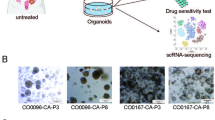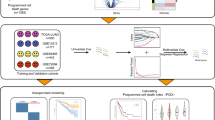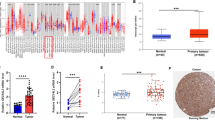Abstract
Purpose
Platinum-based drugs, particularly cisplatin (DDP), are used in the treatment of non-small cell lung cancer (NSCLC). However, development of drug resistance remains the major therapeutic barrier in NSCLC.
Methods
The potential cisplatin resistance-related genes were identified from the global transcriptomes of cisplatin-resistant A549/DDP cells using microarray analysis. Gain- and loss-of-function assays were performed to analyze the effects of Forkhead Box Protein C2 (FOXC2) on the in vitro and in vivo sensitivity of NSCLC cells to cisplatin and its possible molecular mechanisms.
Results
Using global transcriptome analysis, we found that FOXC2 was one of the most upregulated molecules in A549/DDP cells compared with A549 cells. We further confirmed that the expression of FOXC2 was significantly increased in cisplatin-resistant NSCLC tissues. FOXC2 knockdown significantly increased the in vitro and in vivo sensitivity of A549/DDP cells to cisplatin, whereas overexpression of FOXC2 increased cisplatin resistance in cisplatin-sensitive NSCLC cells. Moreover, we found that FOXC2 promoted cisplatin resistance by induction of epithelial–mesenchymal transition (EMT) in NSCLC cells. Furthermore, FOXC2 activated the AKT/GSK3β signaling pathway, and then increased the protein expression of EMT-related transcription factor Snail. Inhibition of AKT or knockdown of Snail reversed FOXC2-induced EMT and cisplatin resistance of NSCLC cells.
Conclusion
FOXC2 enhanced cisplatin resistance of NSCLC cells through activating AKT/GSK3β/Snail/EMT signaling pathway, which may be a potential novel therapeutic target for overcoming drug resistance in human NSCLCs.





Similar content being viewed by others

References
Siegel RL, Miller KD, Jemal A (2016) Cancer statistics, 2016. CA Cancer J Clin 66(1):7–30. https://doi.org/10.3322/caac.21332
Kim ES (2016) Chemotherapy resistance in lung cancer. Adv Exp Med Biol 893:189–209. https://doi.org/10.1007/978-3-319-24223-1_10
Mittal V (2018) Epithelial mesenchymal transition in tumor metastasis. Annu Rev Pathol 13:395–412. https://doi.org/10.1146/annurev-pathol-020117-043854
Nurwidya F, Takahashi F, Murakami A, Takahashi K (2012) Epithelial mesenchymal transition in drug resistance and metastasis of lung cancer. Cancer Res Treat 44(3):151–156. https://doi.org/10.4143/crt.2012.44.3.151
Fischer KR, Durrans A, Lee S, Sheng J, Li F, Wong ST, Choi H, El Rayes T, Ryu S, Troeger J, Schwabe RF, Vahdat LT, Altorki NK, Mittal V, Gao D (2015) Epithelial-to-mesenchymal transition is not required for lung metastasis but contributes to chemoresistance. Nature 527(7579):472–476. https://doi.org/10.1038/nature15748
Singh A, Settleman J (2010) EMT, cancer stem cells and drug resistance: an emerging axis of evil in the war on cancer. Oncogene 29(34):4741–4751. https://doi.org/10.1038/onc.2010.215
Lazarova D, Bordonaro M (2017) ZEB1 mediates drug resistance and EMT in p300-deficient CRC. J Cancer 8(8):1453–1459. https://doi.org/10.7150/jca.18762
Wang X, Ling MT, Guan XY, Tsao SW, Cheung HW, Lee DT, Wong YC (2004) Identification of a novel function of TWIST, a bHLH protein, in the development of acquired taxol resistance in human cancer cells. Oncogene 23(2):474–482. https://doi.org/10.1038/sj.onc.1207128
Sui H, Zhu L, Deng W, Li Q (2014) Epithelial–mesenchymal transition and drug resistance: role, molecular mechanisms, and therapeutic strategies. Oncol Res Treat 37(10):584–589. https://doi.org/10.1159/000367802
Wang T, Zheng L, Wang Q, Hu YW (2018) Emerging roles and mechanisms of FOXC2 in cancer. Clin Chim Acta 479:84–93. https://doi.org/10.1016/j.cca.2018.01.019
Hollier BG, Tinnirello AA, Werden SJ, Evans KW, Taube JH, Sarkar TR, Sphyris N, Shariati M, Kumar SV, Battula VL, Herschkowitz JI, Guerra R, Chang JT, Miura N, Rosen JM, Mani SA (2013) FOXC2 expression links epithelial–mesenchymal transition and stem cell properties in breast cancer. Cancer Res 73(6):1981–1992. https://doi.org/10.1158/0008-5472.CAN-12-2962
Mani SA, Yang J, Brooks M, Schwaninger G, Zhou A, Miura N, Kutok JL, Hartwell K, Richardson AL, Weinberg RA (2007) Mesenchyme Forkhead 1 (FOXC2) plays a key role in metastasis and is associated with aggressive basal-like breast cancers. Proc Natl Acad Sci USA 104(24):10069–10074. https://doi.org/10.1073/pnas.0703900104
Paranjape AN, Soundararajan R, Werden SJ, Joseph R, Taube JH, Liu H, Rodriguez-Canales J, Sphyris N, Wistuba I, Miura N, Dhillon J, Mahajan N, Mahajan K, Chang JT, Ittmann M, Maity SN, Logothetis C, Tang DG, Mani SA (2016) Inhibition of FOXC2 restores epithelial phenotype and drug sensitivity in prostate cancer cells with stem-cell properties. Oncogene 35(46):5963–5976. https://doi.org/10.1038/onc.2015.498
Cui YM, Jiao HL, Ye YP, Chen CM, Wang JX, Tang N, Li TT, Lin J, Qi L, Wu P, Wang SY, He MR, Liang L, Bian XW, Liao WT, Ding YQ (2015) FOXC2 promotes colorectal cancer metastasis by directly targeting MET. Oncogene 34(33):4379–4390. https://doi.org/10.1038/onc.2014.368
Lim JC, Koh VC, Tan JS, Tan WJ, Thike AA, Tan PH (2015) Prognostic significance of epithelial–mesenchymal transition proteins Twist and Foxc2 in phyllodes tumours of the breast. Breast Cancer Res Treat 150(1):19–29. https://doi.org/10.1007/s10549-015-3296-4
Watanabe T, Kobunai T, Yamamoto Y, Matsuda K, Ishihara S, Nozawa K, Iinuma H, Kanazawa T, Tanaka T, Konishi T (2011) Gene expression of mesenchyme forkhead 1 (FOXC2) significantly correlates with the degree of lymph node metastasis in colorectal cancer. Int Surg 96(3):207–216
Jiang W, Pang X-G, Wang Q, Shen Y-X, Chen X-K, Xi J-J (2012) Prognostic role of twist, slug, and Foxc2 expression in stage I non-small-cell lung cancer after curative resection. Clinical lung cancer 13(4):280–287
Jiang W, Fan H, Qian C, Ding J, Wang Q, Pang X (2016) Prognostic value of high FoxC2 expression in resectable non-small cell lung cancer, alone or in combination with E-cadherin expression. BMC Cancer 16:16. https://doi.org/10.1186/s12885-016-2056-0
Zhou Z, Zhang L, Xie B, Wang X, Yang X, Ding N, Zhang J, Liu Q, Tan G, Feng D, Sun LQ (2015) FOXC2 promotes chemoresistance in nasopharyngeal carcinomas via induction of epithelial mesenchymal transition. Cancer Lett 363(2):137–145. https://doi.org/10.1016/j.canlet.2015.04.008
Li C, Ding H, Tian J, Wu L, Wang Y, Xing Y, Chen M (2016) Forkhead Box Protein C2 (FOXC2) promotes the resistance of human ovarian cancer cells to cisplatin in vitro and in vivo. Cell Physiol Biochem 39(1):242–252. https://doi.org/10.1159/000445620
Cai J, Tian AX, Wang QS, Kong PZ, Du X, Li XQ, Feng YM (2015) FOXF2 suppresses the FOXC2-mediated epithelial–mesenchymal transition and multidrug resistance of basal-like breast cancer. Cancer Lett 367(2):129–137. https://doi.org/10.1016/j.canlet.2015.07.001
Zhang CL, Zhu KP, Ma XL (2017) Antisense lncRNA FOXC2-AS1 promotes doxorubicin resistance in osteosarcoma by increasing the expression of FOXC2. Cancer Lett 396:66–75. https://doi.org/10.1016/j.canlet.2017.03.018
Liu H, Gu Y, Yin J, Zheng G, Wang C, Zhang Z, Deng M, Liu J, Jia X, He Z (2014) SET-mediated NDRG1 inhibition is involved in acquisition of epithelial-to-mesenchymal transition phenotype and cisplatin resistance in human lung cancer cell. Cell Signal 26(12):2710–2720. https://doi.org/10.1016/j.cellsig.2014.08.010
Fennell D, Summers Y, Cadranel J, Benepal T, Christoph D, Lal R, Das M, Maxwell F, Visseren-Grul C, Ferry D (2016) Cisplatin in the modern era: the backbone of first-line chemotherapy for non-small cell lung cancer. Cancer Treatment Rev 44:42–50
Yu YH, Chen HA, Chen PS, Cheng YJ, Hsu WH, Chang YW, Chen YH, Jan Y, Hsiao M, Chang TY, Liu YH, Jeng YM, Wu CH, Huang MT, Su YH, Hung MC, Chien MH, Chen CY, Kuo ML, Su JL (2013) MiR-520 h-mediated FOXC2 regulation is critical for inhibition of lung cancer progression by resveratrol. Oncogene 32(4):431–443. https://doi.org/10.1038/onc.2012.74
Cui YM, Jiang D, Zhang SH, Wu P, Ye YP, Chen CM, Tang N, Liang L, Li TT, Qi L, Wang SY, Jiao HL, Lin J, Ding YQ, Liao WT (2014) FOXC2 promotes colorectal cancer proliferation through inhibition of FOXO3a and activation of MAPK and AKT signaling pathways. Cancer Lett 353(1):87–94. https://doi.org/10.1016/j.canlet.2014.07.008
Hall MD, Okabe M, Shen DW, Liang XJ, Gottesman MM (2008) The role of cellular accumulation in determining sensitivity to platinum-based chemotherapy. Annu Rev Pharmacol Toxicol 48:495–535. https://doi.org/10.1146/annurev.pharmtox.48.080907.180426
Holohan C, Van Schaeybroeck S, Longley DB, Johnston PG (2013) Cancer drug resistance: an evolving paradigm. Nat Rev Cancer 13(10):714–726. https://doi.org/10.1038/nrc3599
Wang J, Wei Q, Wang X, Tang S, Liu H, Zhang F, Mohammed MK, Huang J, Guo D, Lu M, Liu F, Liu J, Ma C, Hu X, Haydon RC, He TC, Luu HH (2016) Transition to resistance: an unexpected role of the EMT in cancer chemoresistance. Genes Dis 3(1):3–6. https://doi.org/10.1016/j.gendis.2016.01.002
Rosano L, Cianfrocca R, Spinella F, Di Castro V, Nicotra MR, Lucidi A, Ferrandina G, Natali PG, Bagnato A (2011) Acquisition of chemoresistance and EMT phenotype is linked with activation of the endothelin A receptor pathway in ovarian carcinoma cells. Clin Cancer Res 17(8):2350–2360. https://doi.org/10.1158/1078-0432.CCR-10-2325
Ren J, Chen Y, Song H, Chen L, Wang R (2013) Inhibition of ZEB1 reverses EMT and chemoresistance in docetaxel-resistant human lung adenocarcinoma cell line. J Cell Biochem 114(6):1395–1403. https://doi.org/10.1002/jcb.24481
Haslehurst AM, Koti M, Dharsee M, Nuin P, Evans K, Geraci J, Childs T, Chen J, Li J, Weberpals J, Davey S, Squire J, Park PC, Feilotter H (2012) EMT transcription factors snail and slug directly contribute to cisplatin resistance in ovarian cancer. BMC Cancer 12:91. https://doi.org/10.1186/1471-2407-12-91
Ansieau S (2013) EMT in breast cancer stem cell generation. Cancer Lett 338(1):63–68. https://doi.org/10.1016/j.canlet.2012.05.014
Wang H, Zhang G, Zhang H, Zhang F, Zhou B, Ning F, Wang HS, Cai SH, Du J (2014) Acquisition of epithelial–mesenchymal transition phenotype and cancer stem cell-like properties in cisplatin-resistant lung cancer cells through AKT/beta-catenin/Snail signaling pathway. Eur J Pharmacol 723:156–166. https://doi.org/10.1016/j.ejphar.2013.12.004
Cantley LC (2002) The phosphoinositide 3-kinase pathway. Science 296(5573):1655–1657. https://doi.org/10.1126/science.296.5573.1655
Liu ZC, Chen XH, Song HX, Wang HS, Zhang G, Wang H, Chen DY, Fang R, Liu H, Cai SH, Du J (2014) Snail regulated by PKC/GSK-3beta pathway is crucial for EGF-induced epithelial–mesenchymal transition (EMT) of cancer cells. Cell Tissue Res 358(2):491–502. https://doi.org/10.1007/s00441-014-1953-2
Wang H, Wang HS, Zhou BH, Li CL, Zhang F, Wang XF, Zhang G, Bu XZ, Cai SH, Du J (2013) Epithelial–mesenchymal transition (EMT) induced by TNF-alpha requires AKT/GSK-3beta-mediated stabilization of snail in colorectal cancer. PLoS One 8(2):e56664. https://doi.org/10.1371/journal.pone.0056664
Funding
This study was supported by grants from the National Natural Science Foundation of China (Grant no. 81503103).
Author information
Authors and Affiliations
Corresponding author
Ethics declarations
Conflict of interest
The authors declare that they have no conflict of interest.
Ethical approval
All applicable international, national, and/or institutional guidelines for the care and use of animals were followed. The study was approved by the Institutional Animal Care and Use Committee of Guangzhou medical University.
Informed consent
Informed consent was obtained from all individual participants included in the study.
Rights and permissions
About this article
Cite this article
He, Y., Xie, H., Yu, P. et al. FOXC2 promotes epithelial–mesenchymal transition and cisplatin resistance of non-small cell lung cancer cells. Cancer Chemother Pharmacol 82, 1049–1059 (2018). https://doi.org/10.1007/s00280-018-3697-2
Received:
Accepted:
Published:
Issue Date:
DOI: https://doi.org/10.1007/s00280-018-3697-2



